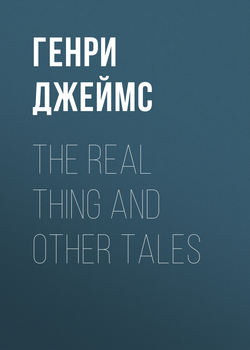The Real Thing and Other Tales

Реклама. ООО «ЛитРес», ИНН: 7719571260.
Оглавление
Генри Джеймс. The Real Thing and Other Tales
THE REAL THING
I
II
III
IV
SIR DOMINICK FERRAND
I
II
III
IV
V
VI
VII
NONA VINCENT
I
II
THE CHAPERON
I
II
GREVILLE FANE
Отрывок из книги
When the porter’s wife (she used to answer the house-bell), announced “A gentleman—with a lady, sir,” I had, as I often had in those days, for the wish was father to the thought, an immediate vision of sitters. Sitters my visitors in this case proved to be; but not in the sense I should have preferred. However, there was nothing at first to indicate that they might not have come for a portrait. The gentleman, a man of fifty, very high and very straight, with a moustache slightly grizzled and a dark grey walking-coat admirably fitted, both of which I noted professionally—I don’t mean as a barber or yet as a tailor—would have struck me as a celebrity if celebrities often were striking. It was a truth of which I had for some time been conscious that a figure with a good deal of frontage was, as one might say, almost never a public institution. A glance at the lady helped to remind me of this paradoxical law: she also looked too distinguished to be a “personality.” Moreover one would scarcely come across two variations together.
Neither of the pair spoke immediately—they only prolonged the preliminary gaze which suggested that each wished to give the other a chance. They were visibly shy; they stood there letting me take them in—which, as I afterwards perceived, was the most practical thing they could have done. In this way their embarrassment served their cause. I had seen people painfully reluctant to mention that they desired anything so gross as to be represented on canvas; but the scruples of my new friends appeared almost insurmountable. Yet the gentleman might have said “I should like a portrait of my wife,” and the lady might have said “I should like a portrait of my husband.” Perhaps they were not husband and wife—this naturally would make the matter more delicate. Perhaps they wished to be done together—in which case they ought to have brought a third person to break the news.
.....
They evidently wished to be discreet—to take care not to swagger because they were gentlefolks. I perceived they would have been willing to recognise this as something of a drawback, at the same time that I guessed at an underlying sense—their consolation in adversity—that they had their points. They certainly had; but these advantages struck me as preponderantly social; such for instance as would help to make a drawing-room look well. However, a drawing-room was always, or ought to be, a picture.
In consequence of his wife’s allusion to their age Major Monarch observed: “Naturally, it’s more for the figure that we thought of going in. We can still hold ourselves up.” On the instant I saw that the figure was indeed their strong point. His “naturally” didn’t sound vain, but it lighted up the question. “She has got the best,” he continued, nodding at his wife, with a pleasant after-dinner absence of circumlocution. I could only reply, as if we were in fact sitting over our wine, that this didn’t prevent his own from being very good; which led him in turn to rejoin: “We thought that if you ever have to do people like us, we might be something like it. She, particularly—for a lady in a book, you know.”
.....